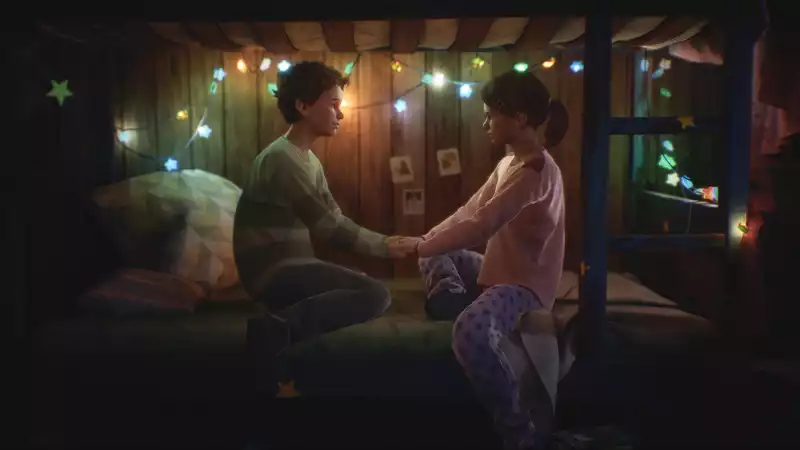Perhaps it is fitting that a game about twins seems to be divided into two parts. One is a dark thriller with supernatural horror. The other is a warm coming-of-age drama about identity and family. Both games have a lot of potential, but the two trains slam into one as they collide and the player is left to pick through the wreckage. There are some good points to salvage, but it feels fractured and broken nonetheless.
What is worth salvaging are the scattered fragments and a second chapter that is large and engaging. Twins Tyler and Allison are reunited for the first time in a decade since the death of their mother, whom Tyler allegedly killed in self-defense. Now they revisit their parents' home and all kinds of painful memories come to the forefront. It is also a story about Tyler's identity as a trans man, his struggles with identity in the past, and how he deals with prejudice in the present.
If "Tell Me Why" had been just that, it might have been one of my favorite games of the year. The depiction of rural Alaska is gorgeous and detailed, and Dontnod has an eye for lived-in spaces as well as vast landscapes. There is a powerful sense of land. Unfortunately, however, it feels almost irrelevant to the story. I wanted to live in the small town drama and explore how Tyler navigates the conservative parts of the world and how he tries to re-establish a relationship with his siblings after being apart for so long. At times, the film lived up to those expectations. Especially in the middle of the film, the twins kept me engaged for long stretches of low-stakes drama as they cleaned out their old house and worked out their frustrations with their father.
The game, like the rest of the game, is let down here by some really simplistic mechanics, dividing itself between dialogue choices and contextual prompts to use items, and a plethora of horribly boring puzzles. There is literally a sequence where you have to count items in the stockroom. Just look at the cans and count them. Surprisingly, however, the game's narrative is at its most clever in these sequences, drawing us into the twins' warm relationship and expressing tender moments of overcoming unresolved pain from the past. The dialogue is rather clunky and over-explained, and the occasional youth language is painfully "hello, kids," but perhaps this adds to the awkward charm of these young people who grew up in isolation.
It never lasts. This is because "Tell Me Why" also wants to tell a dark and mysterious story about the twins' past. A dangerous hooded figure pursues the twins and covers up a conspiracy, while the threat of the supernatural looms over everything. The whiplash you feel when the game swings between these two tones is almost deadly. These two sides of Tell Me Why's story ruin each other, as in the opening sequence, which opens with a heartwarming montage set to indie music just after we see a child confessing to a murder. Its thriller story is spoiled by its desire to be gentle and respectful to its characters and not make them face serious and troubling threats. The game's gentle coming-of-age story is similarly ruined by its strong pull back to a darker, more inclusive story with disturbing and occasionally absurd twists.
Tyler is a one-note character, with his aspirations and insecurities scattered throughout. Even though Tyler is distracted from the reality of what is expected of him, he is still given the care to respect Tyler's identity in a way that is not often seen in a game of this magnitude. The same cannot be said for Allison, who seems to exist to oppose the exploration of Tyler's past. In some ways this may be forgivable because of the focus on the twins, but the rest of the cast is even worse. It is unfortunate, however, that this makes Allison's lack of attention so obvious. The rare moments that give us a glimpse into her past and her life outside of her relationship with her brother bring her and the game to life, despite the monotonous puzzles and choices.
The focus on Tyler's past might have paid off if not for its clumsy handling. The game's thriller plot seems to demand that his life be full of twists and turns, but that only serves to undermine the trauma of abusive parents, which is very real for too many people. There is a lot of material to explore there, but the more the game pursues the mysterious and troubling, the narrower Tyler's room for conflict and healing becomes. Not only that, but the game replaces real-world themes with fantastical ones, and finally introduces the absurd. What began as a dark tale of childhood trauma has turned into a portrait of supernatural evil; I wish Tell Me Why had better blended these elements or abandoned the supernatural altogether.
For a good portion of the middle section, I began to understand the siblings and the town of Delos Crossing and cared about their choices regarding their future. Toward the end of the game, however, the game stopped asking me to engage with two believable people and instead forced me to concern myself with a fantastical and predictable enemy. It is a real shame that "Tell Me Why" abandoned the former, since video games often portray the latter. In that brief scene, "Tell Me Why" really felt like it had something special. I really don't think it's anything but a lost love.
.

Comments